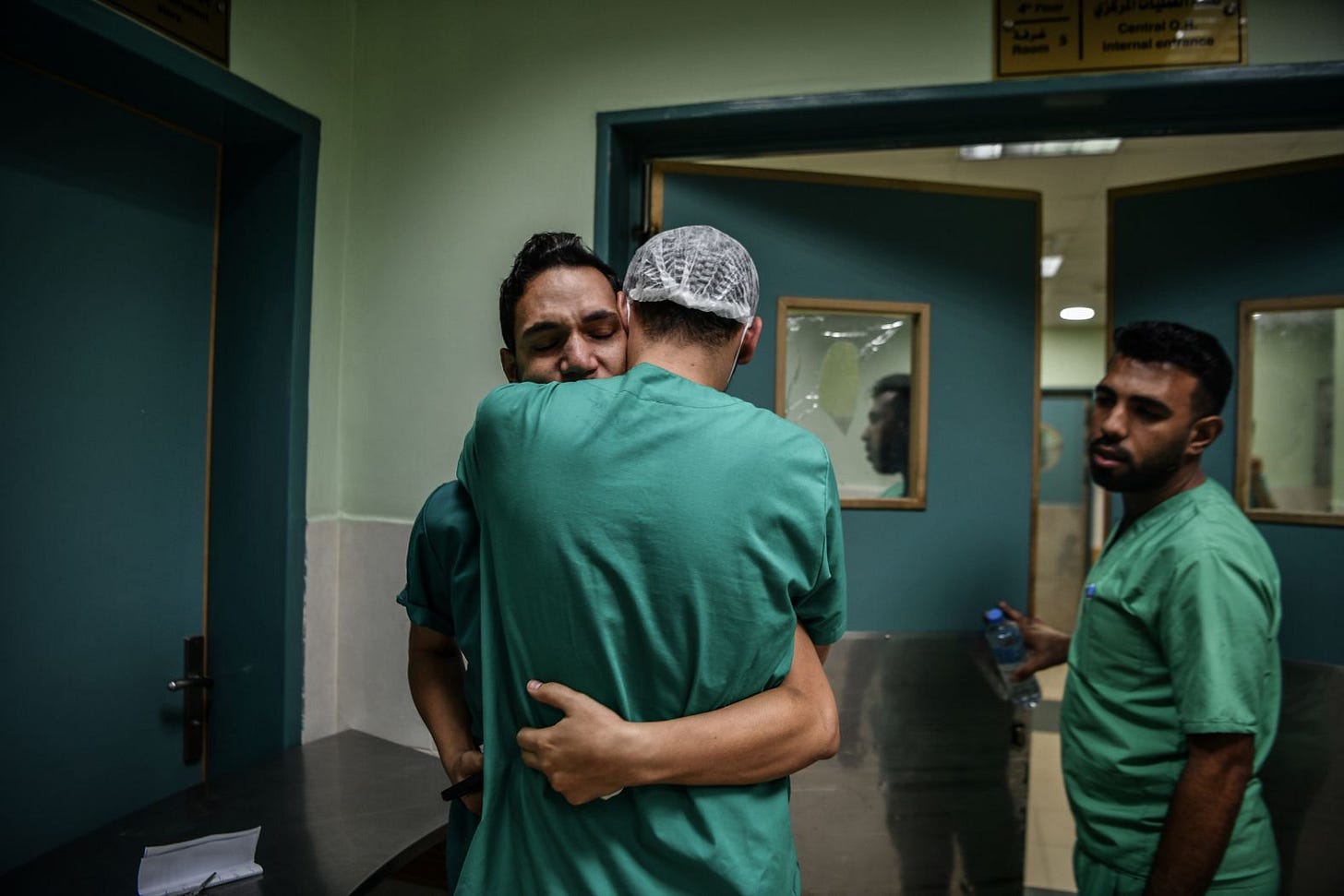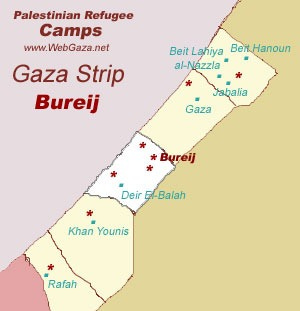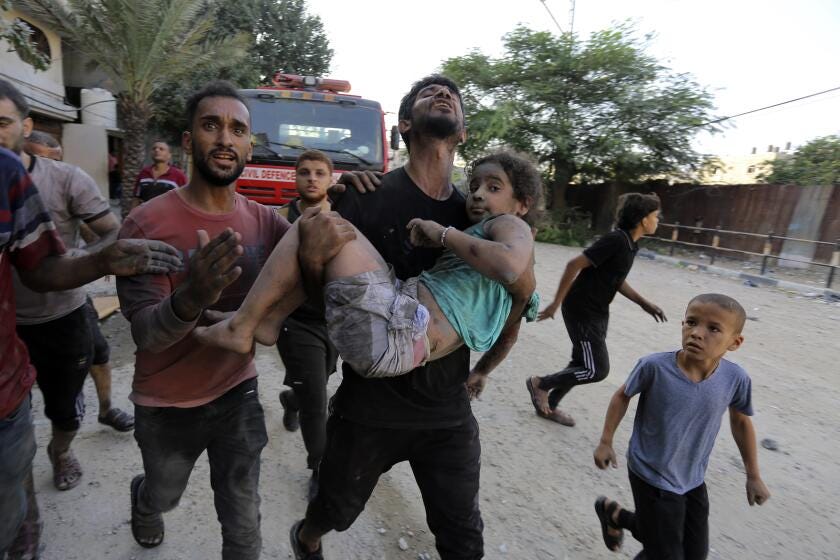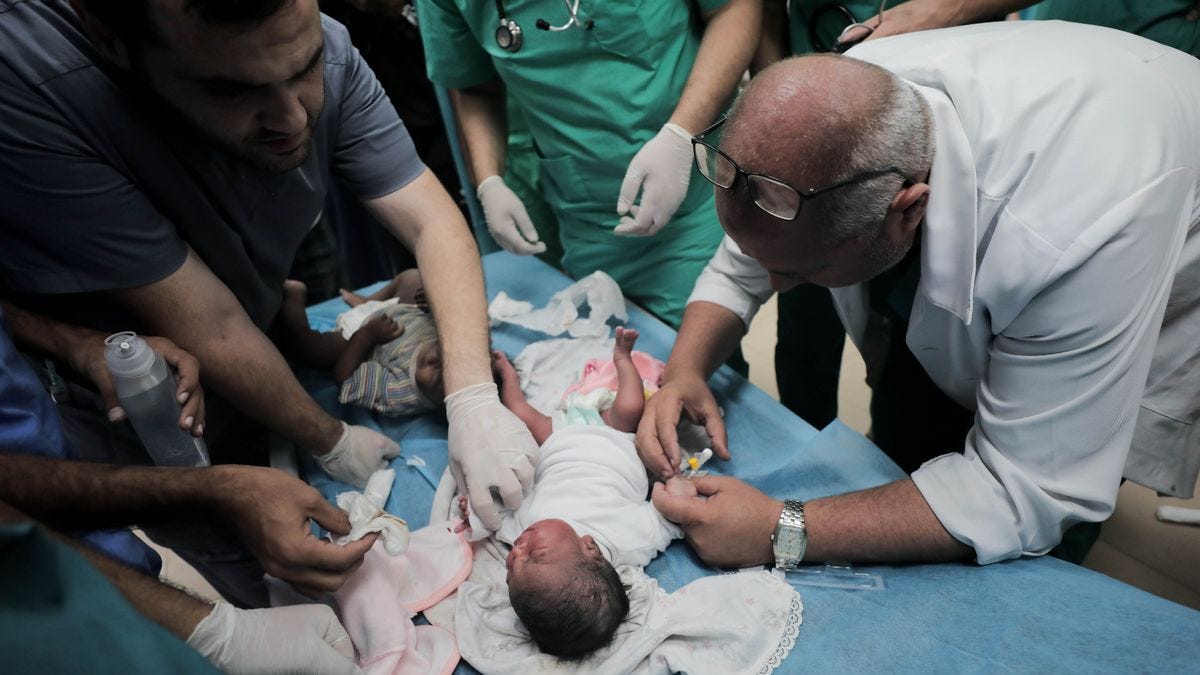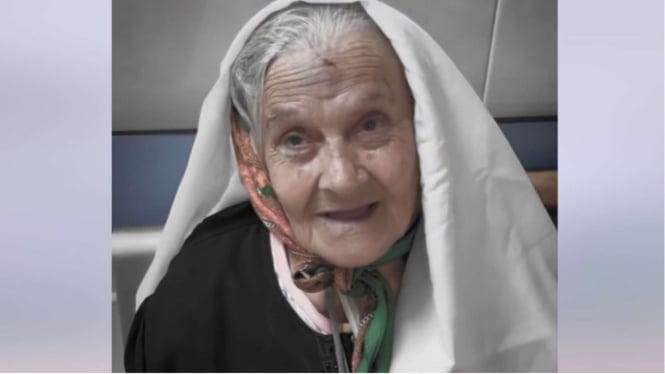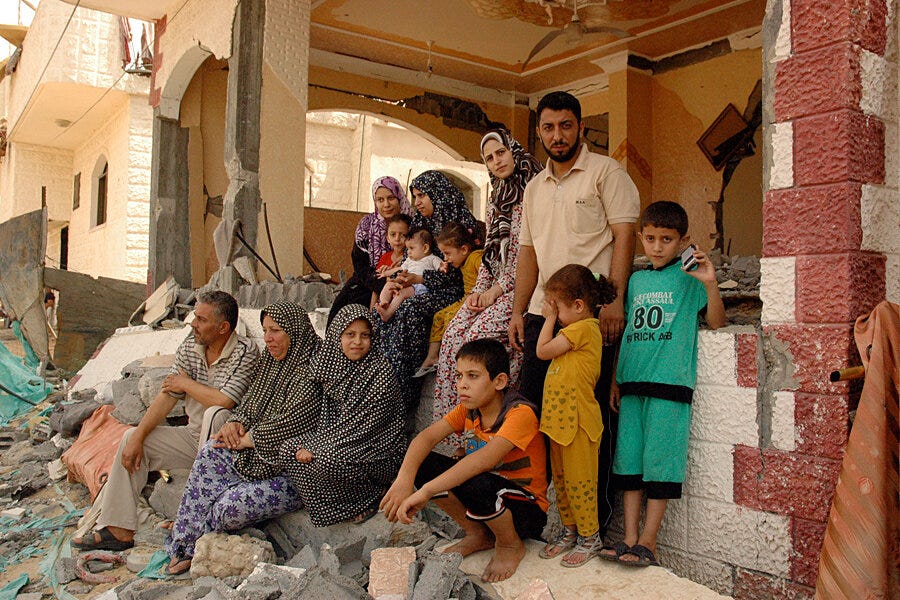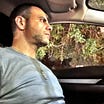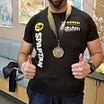Meet Dr. Mohamed - Bringer and Sustainer of Hope
The Doctor’s Story
Author's note: When I asked Mohamed about his life, he spoke without pause, without taking a breath. It felt as though there was no space, not for reflection, not even for feeling. Only the facts, recited one after another. For me, it was an avalanche of aches and burdens. For him, it was simply the facts of his life.
I thought of how he and his wife, both doctors, had taken on the harrowing task of tending to wounds while carrying wounds of their own. To do their work, they had to devote themselves to others and set aside the unrelenting violence that showed itself in every patient. With their roles came responsibility, yet their circumstances made them more vulnerable than most.
They too need the care they give.
The day Dr. Mohammed was born, his mother believed fortune had flowed into their family. He was born in Bureij Camp on the 28th of November, 1999. One of many children in a crowded family home, his childhood was shaped by the hardship of refugee life.
His life began in a camp that sheltered Palestinians who fled from towns in what later became Israel during the Nakba in 1948. His father began working in textiles, and, with time, they moved to Gaza City when Mohammed was fifteen years old. A shift that marked a series of positive events in his life, especially in academics. His sister was a doctor living abroad, and his father hoped for his son to be another in Gaza. Although Mohammed wanted to study engineering, he fulfilled his dad’s wishes without protest.
Medical school at the Islamic University shaped more than his profession. He gained many friends and experiences. The best of these, he told me, was meeting Dr. Nour, his wife. They graduated in June 2023 and married soon after. He remarked that those were the happiest months of his life before the morning of October 7th left him with a sinister warning of what was ahead.
“Pack,” he told Nour. “This won’t be over soon.”
A few weeks later, the bombings came without pause.
An evacuation to the south was advised. Mohammed was reluctant, but all family members insisted. He feared a repeat of the Nakba, the historical displacement that lives in the blood of Palestinians. His family split into two groups. They feared that one route might lead to death for all and wanted to guarantee the survival of at least a few.
He left Gaza City, splitting from his parents and some siblings, who went to Nuseirat, while he, his wife, and others went to Rafah. They lived in a small apartment, just surviving.
Then, about a month into the war, a phone call changed everything.
“It’s the moment I want everyone to know,” he said. “The moment that turned me from a doctor sitting at home into a doctor taking action.”
His phone rang as his head rested on a pillow. It was his middle brother. He was sobbing. His voice shook with panic.
“Help us. Help us. Help us,” he kept repeating. “Mohammad, help us.”
“What’s wrong?” Mohammed asked.
“They bombed the house next to our sister’s. We’re all injured. Your father’s neck… it’s bleeding badly. I don’t know what to do.”
His pregnant sister was there. It was dark. There was no light, no electricity, no aid. His brother was hurt too—shrapnel in his hands. He was trying to stay calm while describing the horror.
“He was crying,” Mohammed said. “I had never heard him cry before.”
He got up instinctively and threw on his clothes and boots. Nour grabbed his arm.
“Where are you going?” she asked. “I need to go. I need to see my family.”
He stepped into the street. No cars. No light. Just the sound of drones humming overhead.
“I just stood there,” he said. “Then I sat on the sidewalk and prayed. I didn’t know what else to do.”
“I’m a doctor,” he said, “and I couldn’t do anything.”
He began calling every contact he had in Deir al-Balah. “My family’s coming. Please help them.”
Friends connected him with doctors at the hospital. They told him his sister had been given oxygen and medication. His father was under observation. The injury was serious—shrapnel to the neck—but too risky to operate. His brother had minor wounds. His mother had only surface injuries, nothing critical.
“That night, I didn’t sleep. I kept thinking: Why am I at home? Everyone’s family could be like mine. My mother, my father, my siblings. Why should I sit and wait?”
The next day, he and Nour gathered their documents and walked into the hospital. They rejoined their medical internship, unpaid. They started training and volunteering at the Emirates Red Crescent Hospital in Rafah, where they stayed for three months.
From that point on, he never stopped.
“Before, I wanted to become a great doctor. But during the war, I wanted only to relieve people’s suffering until things improved.”
He saw in everyone around him his own family and his occupation as an opportunity to serve those families, just as he wished he could have when his own family was injured.
Around May 2024, they were displaced again. Rafah was no longer safe. Mohammed and Nour headed towards Deir al-Balah. There was no house waiting. The only available shelter sat on agricultural land. Two rooms once used as a poultry shed and a livestock shelter.
“It wasn’t fit for human life. I still remember our first night there. I woke up to the sound of rats under me.”
Rent was impossible, and there were few alternatives. His father’s textile business had stopped entirely. Mohammed and his brother, who used to work with him, were also out of work. The only sibling with an income could barely manage his own family.
Basic tasks required planning: fetching water, collecting firewood, and charging phones. They were always trying to stay ahead of necessity.
Despite this, Mohammed continued volunteering officially at Al-Aqsa Martyrs Hospital, in the emergency department, alongside Nour. They worked long shifts, mornings into afternoons, and returned home exhausted. But there was no real end to their day. Their living area became, effectively, a local medical point. Neighbors and strangers began seeking medical help.
“People came at all hours. Sometimes two or three in the morning, knocking. Someone needed an injection. Someone else needed medication. We did what we could.”
Mohammed and his wife continued to volunteer until February of 2025. The sights he had to bear witness to were beyond anything his imagination could conjure. He told me that the most challenging experience was when the hospital itself was bombed while he was on duty. The emergency department was overwhelmed with casualties immediately afterward.
“I vividly remember treating a severely burned man who staggered into the emergency room. I can still remember his smell. Sometimes I imagine it.”
The memory still lingers in Mohammed’s waking life.
It was a terrifying experience for him. Several injured patients arrived, and he had to administer first aid while feeling the heat from fresh wounds.
“Although I’d heard of hospitals being attacked, I was still in shock when the one I worked in was struck. I just responded and treated patients. I could only process what had happened afterward.”
“The hospital was packed. I can tell you every corner, every chair, and every hallway had a displaced person sitting there. You’d walk through the corridors, and there were families everywhere. People thought hospitals were safe. They came to hide there. It was the only place left they thought might still be protected. But in that moment, I realized there was no safe place. Not in this hospital. Not anywhere in Gaza.”
Mohammed shared how he and his wife would talk about their days as they walked back from the hospital. They shared what they saw and felt. He told me how his wife supported him emotionally and how he would uplift her when he himself was low.
“I reached a point where I felt there was no end. But I kept telling Nour: it will end. You’ll see your family again. Sometimes she’d cry. She missed her mother and wanted to hug her. I’d say: be patient. It’ll end soon. We’ll go back home. You’ll see your family.”
Mohammed would repeat the same line every time:
‘Your mom is going to say to you, enough, go back to your husband. That’s enough time here.’
“I said these things to comfort her. But truthfully? Not even one percent of me believed the nightmare would end. I couldn’t imagine it, mentally and emotionally. It felt impossible. But I said it anyway, to give her hope I didn’t feel myself. Inside, what I saw every day made me feel the exact opposite.”
When a ceasefire put a brief pause to the suffering in Gaza, Mohammed and Nour made their way back to the north.
“All through those months of working and volunteering, my only wish was to go back and find my home intact.”
Because when you see nearly all of Gaza completely destroyed, it’s hard to imagine your own home could survive. It was a great relief to find that his home was partially damaged but still inhabitable.
“Of course, there's no water, no electricity, no internet. I’m talking to you now from the street, but at least I found my home, the place I'd dreamed of.”
Mohammed tells me how Gaza is heavily dependent on NGOs and that everything else is at a standstill. He tries to secure work with them, sits exams and interviews, and is told that he isn’t experienced enough.
“I am experienced. The experience I gained during the wars is worth years of normal practice. And still, I’ve kept trying. Even until this moment, every day, I study, take exams, and attend interviews, hoping to secure employment as a doctor. But there are certain requirements and criteria that are difficult to meet.”
I asked Mohammed a few questions and would like to share the truths in his answers.
What changed inside you since the war?
“I became more collaborative. I ask more questions. I speak to taxi drivers and patients—ask how they are, if they need anything. I became someone who thinks of others first. And I began to love people more.”
Someone once asked me, ‘Why do you keep volunteering? You’re not getting paid. You could work for an NGO and make money.’ I told him, "Because I want to help my people. I want to relieve their pain. That’s why I studied medicine—to give what I know to those who need it.”
"Money matters, yes. But what matters more is your humanity.”
Were there moments that gave you hope?
“There was a moment that made me feel like maybe, just maybe, there was still hope. I remember once an elderly woman came into the emergency room. I’ll never forget her.”
“We were asking her questions, trying to understand what was wrong.
I asked her, ‘What’s hurting you?’ For example, I gave her an ECG because I was worried she might be having chest pain or a heart attack, especially since she was elderly.”
“But every time I asked her anything, she would only answer, ‘Ya Rabb, let us return to the north. Please God, let us go back north.’ That day, I laughed a bit and told everyone around me, ‘I swear, we’ll definitely return to the north.”
“Because, you know, older people, when they hold onto something, it gives you a feeling that something good might happen. You draw hope from their persistence.”
I genuinely began expecting that we’d return north just from her repetition: ‘Ya Rabb, take us back north.’ That moment stayed with me. To answer your question clearly: yes, there was hope. There was always hope. Hope existed in every single moment.”
What helps Palestinians endure the occupation?
“The most important factor is family. Family is your shield; family supports you, sustains you. Unity is essential, even though it has some drawbacks like living closely together, but it also has many advantages.
The second most important thing is hope. Hope that God will change the situation and stop the war. That hope kept us believing something positive would happen, something to change our lives.
Thirdly, prayer. Staying consistent with prayers, continually asking God to improve our situation, to end the war, to allow us to return to our homes. Those were our constant prayers.”
Has the situation weakened the Palestinian narrative or resolve?
“No. Palestinians are deeply rooted in their land. Even those whose homes have been destroyed still sit among the ruins, covering broken walls with cloth, refusing to leave.
Palestinians demand to remain on their own land, to live in their own independent state. Maybe Israel wants a state. Well, we also want a state.
We believe in peace, in a two-state solution.
But what became clear during this last war was that Israelis don’t even want us to exist. Palestinians are naturally stubborn. They will remain rooted, resisting simply by surviving, by staying on their land.”
What is necessary for healing?
“What Palestinians need most is security. Safety is the fundamental need for any human being. With security, healing comes naturally.”
”Give Palestinians security, an independent country, a stable government free from factionalism, and dignity, and then you’ve solved their crisis. You’ve allowed them to heal.”
We felt isolated, on another planet. Journalists kept filming the same suffering every day, and no one acted.
I felt frustrated. Why do they film? Who are these images for?
We saw death, blood, and destruction daily. Security is the solution: peace, stability, and no more wars. Our only wish is that war never returns.”
What message would you like to share?
“Never lose hope. No matter how difficult, keep dreaming.
“Hope is life’s foundation.”
“Always check on those around you. Try to help others however you can. If everyone helped, suffering would decrease. Let your humanity guide you.”
(Dr. Mohamed has asked that we not include photos of him. This is completely understandable as doctors and healthcare workers are considered prime targets. We do not wish to put him at additional risk so all images we are using for this story are meant to evoke his story.)
Until Palestine is free,
Hammam Farah, Elham Fund director and co-founder
Selim Tlili, co-writer and editor
PS - we are pleased to share that somehow Dr. Mohamed has found a way to study for his board exams in the midst of the carnage around him and has passed with flying colors!







